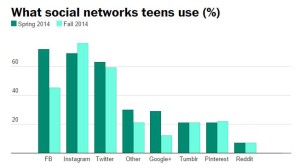How much does the average 20-something save? What are other 20-somethings earning? How are YOU doing financially compared to other young adults your age? Continue reading
Tag Archives: Millennials
How to Get Millennials Back in the Church – Jordan Taylor
I found this video on you-tube, and if you care about Millennials, and the future of the church…

This sarcastic perspective of the Millennial Exodus will definitely cause some laughter.
Why teens are leaving Facebook: “It’s Meaningless”
I found this article on the Washington Post, and I wanted to share some highlights with my readers. Here is the full article.
Here are some of my favorite lines from the article, and my response.
- Teens are leaving Facebook in droves for new friends like Instagram, Snapchat and Twitter — at an estimated rate of up to a million a year. This is not new news, but the decline started almost three years ago. Seeing the decline, Facebook bought Instagram in 2012 for less than $1 Billion.
- With widespread parental supervision on the service, many teenagers prefer the anonymity of Whisper, the iPhone era’s version of PostSecret. Unfortunately, many teens and adults believe that social media is temporary and private. However, anyone can instantly take a screen shot and turn that pic or joke that you thought would go away into a permanent regret.
- “I feel like friend is becoming very vague,” he argued. “It’s like the word love… You say love to a lot of people and things you don’t actually love. It’s more of a compliment now. I know you and I’ll talk to you. It’s like saying, ‘We can converse.’ It’s kind of like being polite.” This young man explains how social media has changed the concept of friendship in our world. The word friend has been water-downed to include more people, yet less intimacy.
- For Eric, adapting to a new type of social media is like learning a new language — a feat studies have shown is easier for young people than it is adults. While I completely agree with Eric, I think that those who believe that adults will not follow their children are underestimating the power of parental curiosity.
- Cnet’s Jennifer Van Grove adds that apps like Snapchat are the “opposite of Facebook: simple, seemingly secret, and fun.” Van Grove writes, “Around schools, kids treat these apps like pot, enjoyed in low-lit corners, and all for the undeniable pleasure and temporary fulfillment of feeling cool.” I believe that the future of social media will promote social exclusivity and practicality uses.
Dr. G. David Boyd is the Founder and Managing Director of EA Resources.
Why Aren’t Black Millennials Leaving the Church?

© 2008 Raphaël Labbé, Flickr | CC-BY-SA | via Wylio
It is important in our research about Millennials to not make generalizations about the generation because broad stereotypes rarely hold up. Millennials are extremely diverse. Here is an article about one subset of Millennials who are not exiting the church, but continue to remain.
If you keep up with Christian news and blogs at all you know there has been a lot of talk about why Millennials are leaving the church.
It is a hot topic for Christian books and speakers, and for good reason. People are trying to understand why Millennials are leaving, if we can get them back and if the problem is with the generation or with the message or presentation of the Church. Continue reading
The “Millennial Exodus” – Is the Future of the Church at Stake?
The Pew Research released a new study confirming that Millennials are exiting the church. If you missed the articles, you can read more HERE and HERE.
I have often heard the expression, “The Church is one generation from extinction” as a reason why youth/children’s ministry is important for the church.
I hate that statement – because it is not true.
The church is not in danger of extinction. Do not fret over the future of HIS church, but have faith in its Owner and Builder and the One who says, “I will always have remnant unto myself.” (Romans 11:3-5) God’s church will stand forever, and even “the gates of hell will not prevail against it.” (Matthew 16:18)

© 2015 Paxson Woelber, Flickr | CC-BY | via Wylio
While the future of the church is NOT at stake; however, the future church may look different.
In the Old Testament, God’s people experienced many times of transition. In Ezra 3, the Jews having been released from Babylonian captivity are working to rebuild the temple. It was a monumental time of celebration; however, we also read:
Yet many of the priests and Levites and heads of fathers’ households, the old men who had seen the first temple, wept with a loud voice when the foundation of this house was laid before their eyes.
Those who had seen the beauty of the first temple were sad because this new temple did not measure up. The passage describes how that within the crowd – some wept while others rejoiced.
As I read Ezra 3, I ask a few questions.
- Did the change in the temple’s foundation display God’s abandonment of His people?
- Did the change in the temple’s foundation reveal that God’s glory was fading?
- Did the change in the temple’s foundation herald that God’s working would be lessened?
I believe that the answer to all three questions is NO. So, what was the cause of their tears?
The future of the church is not at stake; however,

© 2014 Hoshi_sae, Flickr | CC-BY | via Wylio
There will be tears – for those who cling to past forms and formulas of religious institutions. Those who sit in leadership will weep as they see ‘their power’ slipping away.
Tears will fall for the loss of their “majority”.
Tears will fall for the loss of big church and big budgets.
There are tears for those who live in days gone by still looking for God to move as He did in days past. There will be tears.
Tears will fall for those who can only see what was, and assume that what was is what should be.
God’s Spirit is not confined to the forms and formulas of today’s world. God’s work is often found outside religious institutions (If in doubt, check the New Testament.). God’s voice still speaks to those who listen, and has not lost its power.
His spirit is powerful, and working in lives. His breath can shake the mountains. His word can break stone and melt iron. His will can move the hardest of hearts and stir the slumber to action. So may we cling to the power of the word. May we read the word. May we bring his word to those in power.
Lord, may I bring introduce the power of your word to a new generation. And sit back and watch in wonder and amazement as you work in new ways, in new forms, and to a people that You have reserved unto Yourself.
May I not cry at the laying of a new foundation. May I rejoice. May I save my tears. May my hope rest in God alone.
Sola de Gloria.
 Dr. G. David Boyd is the Founder and Managing Director of EA Resources, a non-profit that focuses on providing resources to churches and parents who love emerging adults.
Dr. G. David Boyd is the Founder and Managing Director of EA Resources, a non-profit that focuses on providing resources to churches and parents who love emerging adults.
Millennials move towards Digital News – and they are willing to Pay for it.
NEW YORK — In a world flush with free information, some young people are still willing to shell out for news they read.

© 2013 Esther Vargas, Flickr | CC-BY-SA | via Wylio
A recent poll shows that 40 percent of U.S. adults ages 18-34 pay for at least some of the news they read, whether it’s a print newspaper, a digital news app or an e-mail newsletter. Another 13 percent don’t pay themselves but rely on someone else’s subscription, according to the survey by Media Insight Project, a collaboration of the American Press Institute and the Associated Press–NORC Center for Public Affairs Research. Older Millennials are more likely than younger ones to personally pay for news.
Here are some points to consider:
- “The proliferation of free news online and new ways for advertisers to reach people has besieged publishers of newspapers and magazines.”
- “Some popular news sites, particularly newer online-only outlets like Huffington Post and BuzzFeed, remain free to all.”
- “Millennials have shown that they are willing to engage in content that interests them,” Herndon said (a professor of journalism).
What does this mean for the church?
- Brand is often more important than price. Millennials who are willing to pay money for news know how to obtain this same news for free from other sources. These Millennials are interested in a specific perspective or “brand” of news.
- Many churches spend resources on their on-line presence without examining the results of that work. Does your church know who is utilizing your electronic media? Many churches have gone with current technologies, but the content does interest Millennials (for various reasons).
- I believe their willingness to pay for digital news is driven by their value of conservation of natural resources and their technology-driven lifestyle. In the church world, the paper bulletin still reigns, but even its days may be coming to an end.
Dr. G. David Boyd is the Founder and Managing Director of EA Resources.
So You Want to Start a Young Adult Ministry

Blazing New Trails within the Church
 I want to share the story of a trailblazer -she didn’t see a path for her beyond youth group, so she made one. Continue reading
I want to share the story of a trailblazer -she didn’t see a path for her beyond youth group, so she made one. Continue reading
When the Church is Fighting over Coffee Pots

© 2010 Richard Masoner / Cyclelicious, Flickr | CC-BY-SA | via Wylio
I am still shocked and amazed that it happened. I had heard stories about church conflict centered on the color of carpet or the VBS theme, but it would never happen in my church.
Never say never.
In the midst of a church business meeting, a discussion began that resulted in a fight over the use of coffee pots. Harsh words were uttered. People were angry.
In a room where the average age was well over forty
In a room that was holding the leadership of our church.
In a room where gray hair ran rampant, and where wisdom and maturity were supposed to be found in abundance.
In this room selfishness reigned and child-like behavior was obvious.
Sometimes immature behavior gets ascribed to… well, to those who are younger (or to people we don’t like or agree with). Yet at that moment, it was difficult to imagine any other age group having this same conversation.
Psalm 119: 99,100 says,
I have more insight than all my teachers, for I meditate on your statutes. I have more understanding than the elders, for I obey your precepts.
Spiritual maturity is not dependent upon age, but upon the individual’s meditation and obedience to God’s word. We all make assumptions about others based upon their age – which is defined as Ageism. Ageism is prejudice or discrimination based upon age, and I believe it to be one of the causes of the Millennial Exodus (or why young adults are leaving the church).
When judged by his age, Paul commands Timothy to stand strong against ageism, “Don’t let anyone look down upon you because you are young.” (1 Timothy 4:12) Timothy was called to lead, and Paul knew that his character and calling (rather than age) were the foundation of his leadership.
Why then are young adults often excluded from leadership because of age? (read more)
For several years in a community where I served, I regularly questioned why our leadership had to be over fifty. After nominating many young(er) adults, they were always mysteriously removed for the same reason – they were in the wrong ‘phase of life’ (aka – anyone with children in the home). It was thinly veiled ageism – excluded people due to their age.
When the coffee pots become the center of your church meetings, it reveals that something is wrong.
Your church may be equating age with maturity.
 Dr. G. David Boyd is the Founder and Managing Director of EA Resources. He is passionate about equipping parents and churches to reach Millennials. If there is some way that he can serve your community, contact him at gdavid@earesources.org.
Dr. G. David Boyd is the Founder and Managing Director of EA Resources. He is passionate about equipping parents and churches to reach Millennials. If there is some way that he can serve your community, contact him at gdavid@earesources.org.
Why You Need to Be Yourself When Marketing to Millennials
Earlier this week, I posted an article about Hilary Clinton’s tweet that offended Millennials and how the church can learn from her mistake.
Here is a new article that while focusing on marketing can reveal how churches often drive Millennials away.

Authenticity is a buzzword – especially among churches.
Yet the meaning is different for Millennials that other generations (Read more HERE).
If you are seeking Millennials, it is crucial to be true to yourself. As I reflected on how churches attempt to appeal to Millennials in inauthentic ways, here are a few questions that came to mind.
1. Do you claim to be non-denominational, and yet have clear ties and restricted beliefs for your community?
2. Do you claim diversity, and yet have none? (For example, when using “Stock” photos, do you accurately represent your community?)
3. Do you claim to be earth-friendly, and yet don’t recycle? I know of two large churches in my community who actually put out recycling containers to appear eco-friendly, and yet were unwilling to pay for recycling (and they were throwing the recyclables in the garbage).
4. Do you claim to empower women and yet don’t have any in leadership?
I do not believe that you have to change your communities policies in these areas; however, you should accurately display them.
The main point of the article is that we should truly express our community’s set of beliefs (rather than hiding – or using a “bait and switch” technique). While these beliefs may turn away some people, they will help others find a place where they belong.
 Dr. G. David Boyd is the Founder and Managing Director of EA Resources. If he can assist your community to reach Millennials, please contact him at gdavid@earesources.org.
Dr. G. David Boyd is the Founder and Managing Director of EA Resources. If he can assist your community to reach Millennials, please contact him at gdavid@earesources.org.





